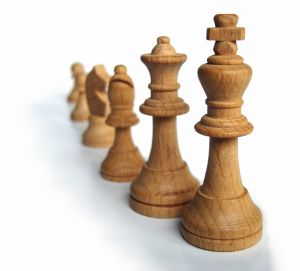Making it Difficult
After several years of working on my chess improvement and from talking to both amateurs and masters it appears that adult amateurs tend to complicate their chess improvement by reading books and tackling concepts that are far too advanced for their level.
So, here is my attempt to simplify my chess training and bring it back to basics. This program is targeted for players under 1700 USCF.
Study, Play, Review
The study portion of the plan will consist of doing tactical puzzles at the Chess Tempo site every day for a minimum of 30 minutes. You will also spend a minimum of 1 hour studying any areas dictated by reviews of our standard games which we will label focused study.
Play will consist of a minimum of 2 standard games per week of either OTB play or on ICC / chess.com. The two take aways from this is that your rating will serve as a progress report, and that the games should be 15 minutes or longer (the longer the better). The content of these games will serve as the material for the focused study portion of the plan.
Every standard game has to be reviewed afterwards. Go over the game without the use of an engine, and annotate what you were thinking. After having reviewed it on your own, have the engine analyze the game and then compare your notes with the engines analysis. Take this opportunity to review the opening phase, and what you could have done to improve that phase of the game by consulting opening books if necessary. Take note of mistakes made and in which phase of the game they were made. You will then focus your next study day on reviewing any content that will help prevent the mistakes made.
Here’s an example of what a week would look like when following the plan:
Monday
Play G/15 or >
Study tactics 30m
Tuesday
Review Monday’s game (annotate and identify weaknesses in play)
Study tactics 30m
Wednesday
Focus Study 1h (Study is based on weaknesses from reviewed game, for example K&P endgame review if game lost in the endgame, or extra tactics study if game was lost due to a tactical oversight)
Thursday
Play G/15 or >
Study tactics 30m
Friday
Review Monday’s game (annotate and identify weaknesses in play)
Study tactics 30m
Saturday
Focus Study 1h (Study is based on weaknesses from reviewed game, for example K&P endgame review if game lost in the endgame, or extra tactics study if game was lost due to a tactical oversight)
Sunday
Rest day or you can use this day to catch up on your studying, do extra tactics or play blitz games, etc.
 The brain needs time to assimilate and integrate new information as knowledge and to resolve conflicts with previously learned concepts and plateaus equate to slower progress while we assimilate new ideas. Not until we internalize these new ideas as knowledge are we able to move on to the next phase in our learning. Plateaus are a normal phase of the learning process. The goal is to minimize the amount of time spent in a plateau, and to identify if our plateau is part of the normal learning curve or if it is a result of a deficiency in our learning process.
The brain needs time to assimilate and integrate new information as knowledge and to resolve conflicts with previously learned concepts and plateaus equate to slower progress while we assimilate new ideas. Not until we internalize these new ideas as knowledge are we able to move on to the next phase in our learning. Plateaus are a normal phase of the learning process. The goal is to minimize the amount of time spent in a plateau, and to identify if our plateau is part of the normal learning curve or if it is a result of a deficiency in our learning process.